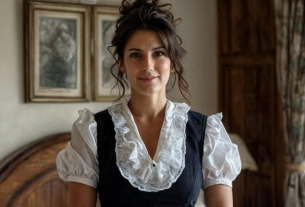The phone rang at half past six in the morning. Lera reached for the phone without looking at the screen, thinking it was her alarm. But her husband’s voice made her wake up sharply.
“Mom is in the hospital,” Maxim said, panic evident in his voice. “A stroke. We need to go urgently.”
Lera sat up in bed, trying to process what she had heard. Galina Petrovna had always seemed like an iron woman who would outlive everyone around her. And now this. Her hands instinctively reached for clothes, her thoughts were tangled, but one thing was clear — she had to act.
At the hospital, the doctor spoke plainly and to the point. Ischemic stroke, left side affected, speech impaired. Recovery was possible but would require long-term care and rehabilitation. Lera listened, took notes in her notebook, asked questions about treatment. Maxim stood nearby, pale and confused.
“Who will be with your mother?” the doctor asked. “Round-the-clock care is necessary for the first few months.”
Lera glanced at her husband. Maxim worked at a factory, twelve-hour shifts, and couldn’t take time off. The younger son, Andrey, lived in another city and came only once every six months. The elder son, Igor, had not spoken to his mother for three years after divorcing his first wife.
“I will,” Lera said without hesitation.
Galina Petrovna was discharged a week later. Lera transformed the living room into a hospital ward. A functional bed, a bedside table, a bedpan, diapers — everything needed for a bedridden patient. She had to quit her job at the insurance company. The boss didn’t hide his displeasure, but what choice was there?
Days blurred into an endless series of procedures. In the morning — blood pressure measurement, medication dispensed strictly on time. Breakfast pureed with a blender because Galina Petrovna couldn’t swallow solid food. Turning every two hours to prevent bedsores. Massage, gymnastics for the paralyzed arm, coaxing her to say at least one word.
“Ma-ma,” Lera repeated, holding her mother-in-law’s healthy hand. “Say ma-ma.”
Galina Petrovna stared at the ceiling as if she didn’t hear. Sometimes it seemed she understood but didn’t want to respond. Lera kept working, believing patience would bring results.
After a month, her mother-in-law began to say individual words. Unclear, with difficulty, but still. Lera rejoiced at every sound, recording progress in a notebook kept on the doctor’s recommendation. A speech therapist came twice a week, but most of the work was done by Lera — repeating exercises, forcing her to read children’s books syllable by syllable.
Physical recovery was slower. The left hand barely moved; Galina Petrovna could walk only with support. Lera helped her to the bathroom, assisted with washing and dressing. Intimate procedures were especially hard — a proud woman could not accept helplessness.
“Why do you torment me?” Galina Petrovna asked hoarsely one day when Lera was changing the bed linens.
“I’m not tormenting, I’m healing,” Lera answered, smoothing the sheet. “The doctor said movement is necessary.”
“The doctor…” her mother-in-law grimaced. “Very young. What does he know?”
Lera didn’t argue. Galina Petrovna had always been a difficult person, and illness hadn’t improved her character. She had to endure tantrums, sharp words, dissatisfaction with everything. The food was not right, the medicine was bitter, the pillow uncomfortable. Lera changed, redid, adapted to her moods.
By the end of the second month, her mother-in-law stood on her feet. She walked slowly, leaning on a cane, but independently. She could feed herself, though her left hand was still weak. Speech was almost fully restored, except for slight incoherence.
“How are you?” Maxim asked, returning from work.
“Better,” Lera replied, clearing plates after dinner. “Today I walked to the kitchen without a cane.”
“Thank God,” her husband sighed. “Maybe things will get better soon.”
Lera nodded but doubted inside. Recovery was dragging on, and Galina Petrovna was becoming increasingly demanding. Every day brought new tantrums and complaints.
“The soup is too salty,” her mother-in-law declared at lunch. “Completely inedible.”
Lera tasted it — the salt was just right. But she stayed silent, took the bowl back to the kitchen, and cooked again. It was easier than arguing. Galina Petrovna criticized everything — cooking, cleaning, medicine, even how Lera made the bed.
“The sheets are unevenly tucked,” her mother-in-law said. “The wrinkles make it uncomfortable to lie down.”
“The pillow is too high.”
“The window is opened the wrong way, draft.”
Lera redid, corrected, agreed. She understood that illness had made Galina Petrovna helpless, and the criticism was a way to maintain some control over the situation. It was hard to endure, but there was no choice.
The worst was when her mother-in-law began comparing Lera to Vika — the first wife of the elder son. Igor divorced Vika three years ago, but Galina Petrovna still considered the ex-daughter-in-law perfect.
“Vika always made juicy cutlets,” her mother-in-law said, poking at her plate with a fork. “Not dry like yours.”
Lera pressed her lips tight. The cutlets were ordinary; no one had ever complained. But she said nothing and cleared the plate. She would cook differently tomorrow.
“Vika knew how to do massages properly,” Galina Petrovna continued while Lera was massaging the paralyzed arm. “Your hands are stiff, unpleasant.”
“I’m trying,” Lera said quietly.
“Trying is good, but skill is more important.”
Every day brought new comparisons. Vika cleaned better, dressed prettier, spoke smarter. Lera listened silently, continuing to care, cook, take her to doctors. Her strength was running out, but she couldn’t stop.
“Why don’t you respond when Mom praises you?” Maxim asked one evening.
“Praises?” Lera didn’t understand. “When?”
“Well, she says Vika would be worse.”
“Maxim,” Lera looked wearily at her husband. “Galina Petrovna constantly says that Vika would do better. Every day.”
“Maybe you imagined it?” he shrugged. “Mom is grateful, she just doesn’t know how to show it.”
Lera didn’t argue. Maxim worked all day, came home tired. He only heard bits of conversations and didn’t understand what it was like to be under constant criticism. It was easier to stay silent.
By the fourth month of caregiving, Lera had lost ten kilograms. She slept four hours a night because Galina Petrovna often woke at night demanding water, medicine, help to go to the toilet. Friends stopped calling — there was no time for meetings, conversations boiled down to complaints about fatigue.
“Maybe we should hire a caregiver at least for the weekends?” Maxim suggested.
“With what money?” Lera massaged her temples; her head had been aching for three days in a row. “Caregivers charge fifty thousand a month. We only have your salary.”
“Well, what to do?”
“I don’t know.”
Lera really didn’t know. Leaving her mother-in-law was impossible — Maxim wouldn’t forgive her, and her conscience wouldn’t allow it. But continuing like this meant losing herself completely. She had been without work for six months, her savings were gone, social ties broken.
“Maybe Igor can help?” Lera cautiously suggested.
“Igor doesn’t communicate with Mom. You know that.”
“But she’s his mother.”
“Try talking to him.”
Lera called Igor the next day. The conversation was short and painful.
“I won’t help,” Igor said. “Mom chose who to communicate with and who not to.”
“But Igor,” Lera tried to find the right words, “Galina Petrovna is sick, she needs help.”
“Let Maxim deal with it. Or Vika. Mom thinks Vika is the best.”
“Vika is no longer family.”
“So am I family?” Igor’s voice was hurt. “When I divorced, Mom took Vika’s side. Said I was a scoundrel who ruined a good woman. Now let Vika take care of her.”
The call went silent. Lera understood there was no help to expect. Maxim worked, Andrey lived far away, Igor was offended. All the burden fell on her alone.
“Who called?” Galina Petrovna asked.
“Igor. Asked how you are.”
“He’s lying. Igor wouldn’t call. Probably you called yourself, asking for help.”
Lera said nothing. Arguing was useless.
“You’re wasting your effort,” her mother-in-law continued. “Igor won’t forgive. And if Vika asked, he’d come immediately.”
“Maybe so.”
“Vika knew how to deal with people. Not like you.”
Lera went to the kitchen to avoid saying too much. Her hands trembled with fatigue and anger. Six months of selfless care, and in response only criticism and comparisons with a woman who wasn’t even family.
In the evening, Maxim found Lera on the balcony. She was sitting on a chair, staring into space.
“What’s wrong?” her husband asked.
“Tired,” Lera answered shortly.
“Did Mom say something again?”
“As usual.”
“Don’t pay attention. Illness affects character.”
“Maxim,” Lera turned to her husband, “your mother is not ill in character. Galina Petrovna knows perfectly well what she’s saying.”
“Don’t exaggerate.”
“I’m not exaggerating. For six months I’ve heard how wonderful Vika is, and how bad I am. Every day.”
“Maybe Mom wants you to try harder?”
Lera looked at him carefully. Maxim genuinely did not understand the problem. For him, it was natural that his wife cared for his mother, endured tantrums, criticism, ingratitude, sacrificed her job, health, and nerves for the family.
“I’m trying my best,” Lera said. “But it’s not enough.”
“Not enough for what?”
“For basic respect.”
Maxim shrugged as if he didn’t understand what she meant. He kissed his wife’s head and went inside. Lera stayed on the balcony, looking at the summer evening. Somewhere below, children laughed, cars passed by, life went on normally. But here, within four walls, time had stopped. An endless circle of procedures, tantrums, dissatisfaction. And no gratitude.
The next morning Galina Petrovna woke up in a bad mood. Breakfast was tasteless, medicine bitter, the weather terrible. Lera silently endured the complaints, cleaned up, cooked again. The habit of enduring had seeped into her skin.
“Vika never served cold porridge,” her mother-in-law said, pushing the plate away.
“The porridge is hot,” Lera quietly objected.
“Maybe for you. But for a sick person, it’s cold.”
Lera took the plate to reheat. In the kitchen, she stopped and dropped her hands. She couldn’t do it anymore. Six months of humiliation, six months of sacrifices unnoticed. Six months of comparisons with a woman who wasn’t even family.
She returned to the room with hot porridge. Galina Petrovna had already forgotten her complaint and was looking at photos on the bedside table.
“That’s Vika with Igor at their wedding,” her mother-in-law pointed to a picture. “What a beautiful couple. Too bad they divorced.”
“Too bad,” Lera agreed.
“If Vika were here, she would take better care. She would understand what a sick person needs.”
Something snapped in Lera’s head. Her patience ran out. She put the porridge on the table, straightened up, and looked at her mother-in-law.
“Would Vika be better?” Lera asked, and unfamiliar notes sounded in her voice.
“Of course. Vika is attentive, caring…”
“Then why do you need me?”
Galina Petrovna looked at her daughter-in-law in surprise. Lera stood straight, fists clenched, eyes burning.
“What do you want to say?” her mother-in-law asked.
“I want to say that for six months I’ve heard how wonderful Vika is. Six months I’ve heard I do everything wrong. Six months I’ve sacrificed my life and received only criticism in return.”
“You’re exaggerating…”
“I’m not. I quit my job, forgot about friends, don’t sleep at night. I cook, clean, take her to doctors, endure tantrums. And you only compare me to Vika.”
Galina Petrovna opened her mouth, but Lera didn’t let her speak.
“You know what, Galina Petrovna? If Vika is so wonderful, let her take care of you. Call her, ask. Maybe she’ll agree.”
“Vika won’t come.”
“Why? She’s wonderful.”
“Vika is not family.”
“And I am? For six months I’ve felt like a hired caregiver.”
“You’re a daughter-in-law. It’s your duty.”
“A duty is to help. But not to endure rudeness.”
“What rudeness?”
“Constant comparisons with another woman. Criticism of every action. Ingratitude.”
“I am grateful…”
“Not true. You never said thank you. Never acknowledged that I helped.”
“Thank you,” Galina Petrovna said quietly.
“Too late. Six months was time to say it sincerely.”
Lera took her bag and headed to the door. In the hallway, she met Maxim.
“Where are you going?” her husband asked.
“To my mother’s.”
“Why?”
“To think.”
“Think about what?”
“Whether to live in a house where you’re not respected.”
“Lera, don’t exaggerate.”
“I’m not exaggerating. Ask Mom what she thinks of me.”
“Mom loves you.”
“Loves? Or tolerates?”
“I don’t see the difference.”
“That’s the problem. You don’t understand.”
Lera left the house, leaving her husband alone with his mother. For the first time in seven months, she didn’t give in, didn’t submit, didn’t stay silent. For the first time, she put herself first.
The next day Maxim called her workplace.
“Mom is feeling unwell,” he said. “Can you come?”
“I can’t. I’m working.”
“Lera, she’s really sick.”
“Call an ambulance.”
“She’s not that sick. Just needs support.”
“Support can be given by Vika.”
“What Vika?”
“The same one your mother compared me to for seven months.”
“But Vika is not family.”
“And I am? After seven months of humiliation?”
“Lera, don’t be so harsh.”
“Harsh? It’s harsh to expect gratitude for selfless work.”
“Mom is grateful. She just doesn’t know how to show it.”
“She knows. She showed it to Vika. Let her show it to Vika now.”
Lera hung up. That evening she didn’t go home but stayed at her mother’s. She told the whole story, cried. Her mother listened, stroked her head, said the right things.
“You did the right thing,” her mother said. “You can’t let people treat you like that.”
“But she’s sick…”
“She was sick. Now she’s healthy and manipulates.”
“Maxim doesn’t understand.”
“Maxim is a mama’s boy. For him, Mom is always right.”
“What to do?”
“Live your own life. Work, be happy, don’t sacrifice yourself in vain.”
“And if they don’t forgive?”
“They won’t. Their loss. You’re a good woman, you deserve better.”
A week later, Galina Petrovna called herself.
“Lera,” her voice sounded embarrassed, “can we talk?”
“We can.”
“Will you come?”
“No. Speak on the phone.”
“I… I wanted to apologize.”
“For what exactly?”
“For comparing you to Vika. For criticism. For ingratitude.”
“I accept your apology.”
“Will you come back?”
“No.”
“Why not?”
“Because I don’t believe it’s sincere.”
“I sincerely repent.”
“Seven months was time to repent. You didn’t.”
“Lera, I understand I was wrong…”
“You understand now. When you lost your free servant.”
“Don’t speak so harshly.”
“I’m telling the truth. When I was needed, you humiliated me. Now that I’m gone, you remember politeness.”
“What must I do for you to forgive?”
“Nothing. It’s too late.”
“But I am Maxim’s mother…”
“So what? Does that give you the right to humiliate your daughter-in-law?”
“No, of course not…”
“Well, we’ve talked.”
Lera hung up feeling strange relief. Seven months of patience and humiliation were in the past. Ahead was a new life — her own, not sacrificial, not devoted to ungrateful people.
Work brought pleasure, salary allowed renting a small apartment. Lera gradually restored social connections, met friends, read books. Life was getting better.
Maxim came to persuade her to return. He promised his mother would change, that there would be no more comparisons or criticism. But Lera knew the value of those promises. Galina Petrovna wouldn’t change because she didn’t consider herself guilty.
“Mom is trying,” Maxim said. “She doesn’t complain anymore.”
“Because she has no one to complain to.”
“Lera, give her a chance.”
“I gave seven months. Enough.”
“But she is family…”
“Family are those who respect and appreciate. Not those who are related by blood.”
A month later, Lera learned Maxim had hired a paid caregiver. Galina Petrovna was unhappy — the stranger didn’t understand habits, cooked incorrectly, cleaned the wrong way. But there was no choice.
“See,” said Lera’s mother. “When you have to pay money, they immediately find a way to get by.”
“I’m not glad,” Lera replied. “I just won’t let myself be used anymore.”
“Right. Sacrifice must be mutual.”
“Or at least recognized.”
“At least.”
Lera continued living separately, working, building new relationships. Sometimes she thought of Maxim but without regret. Her husband had chosen his mother, failed to protect his wife. Now he could live with the consequences.
And Lera learned to live for herself. For the first time in a long time, she didn’t look back at others’ needs, didn’t sacrifice herself for ungrateful people. And she understood this was right. Because those who can’t appreciate sacrifices don’t deserve them at all.



